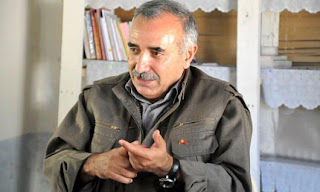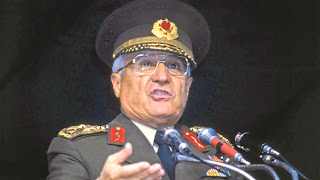PHOTO from Radikal
Though Turkish society is pretty evenly divided between those who support the ruling AKP and those who do not, perhaps the more important divide in terms of determining the county's trajectory is within the government.
AKP officials have been careful to play down any division within party ranks, but events over the past year hint of a fissure between a faction in the party loyal to Prime Minister Erdogan and another closely aligned with Fethullah Gulen, a religious leader based in Pennsylvania who runs the Hizmet
movement, a powerful network consisting of tens of thousands of followers (of those sympathetic to the movement, there are estimates well over 5 million) that has sought to exert its influence within the state and Turkish society.
Though Gulen and his supporters have stopped short of forming a political party, they have managed to gain key positions within state institutions and the ruling party. (For a nuanced take of the movement's engagement with state institutions, including its tactics and ruminations of its overall strategy, see Berna Turam's
Between Islam and the State: The Politics of Engagement.)
Further, critical investigations into the movement's activities have not been welcome. As foreign journalist Justin Vela
explored last week in
Foreign Policy, allegations have long existed that the movement is behind the operations against Ergenekon, the opaque deep-state organization accused of terrorism and plots to overthrow the state. Indeed, it was the Gulen movement journalist Ahmet
Şık was investigating when he was charged as a member of Ergenekon.
While Gulenists wield considerable influence in the AKP, they do not necessarily determine the direction of the party, and divisions within AKP's ranks in recent months indicate what, according to many observers, is a power struggle between the Hizmet/Gulen movement and Prime Minister Erdogan.
These include a debate last month on a law that reduced sentences for wealthy businessmen charged with fixing football matches, as well as a difference in approaching the air strikes at Uludere that killed 34 Kurdish smugglers. In the latter instance, Prime Minister Erdogan defended the military and intelligence services while Gulen-affiliated press leveled accusations that the strikes were the work of the "deep state." For an example, in Turkish, see
this op-ed in
Zaman criticizing the government for not noticing what the author alleges is a deep-state conspiracy.
The most recent evidence of a difference of opinion between the two parties centers on whether former Chief of General Staff Ilker Basbug, who was arrested little more than a week ago, should be tried at the Constitutional Court or by the specially-authorized court that issued the warrant for his arrest. Most interestingly, President Gul, thought to be friendly to the Gulen movement, has broken ranks with it and
called for Basbug to be tried at the Constitutional Court in accordance with what seems like a relatively clear dictate (Article 148) in the Turkish Constitution that chiefs of staff and force commanders are to be tried at the Supreme Court (for more on Basbug, and the rather nonsensical charges of how the former commander could overthrow the government using website, see past posts and
this excellent bit of analysis by Gareth Jenkins). Prime Minister Erdogan, for his part, has said he
supports Basbug's release pending trial.
Yet AKP members close to the Gulen movement disagree with both these positions. Instead, they have asserted that Basbug can be tried by the specially-authorized court because the charges against him are not related to his duties as Chief of General Staff and that the release of Basbug and other serving and retired military officials charged in connection with membership in Ergenekon would only encourage further acts of terrorism.
One of the most outspoken of these members is deputy chairman Huseyin Celik, who is known to be quite close to the Hizmet movement and before served as Minister of Education. In response to Gul, Celik reaffirmed his position that Basbug can be tried before the specially-authorized court. Gulen-affiliated
Zaman ran Celik's comments last Thursday (in Turkish, click
here). Other AKP members known to be close to Gulen have also taken Celik's view, including deputy chairman
Mustafa Elitas, who contended that the president's views were not important, as well as
Ayhan Sefer Ustun and
Burhan Kuzu, who are, respectively, heads of the parliament's human rights and constitutional commissions.
Enough is Enough?
At the same time parliament appears divided on the issue of Basbug, Deputy Prime Minister Bulent Arinc
announced last Wednesday that elected CHP deputies Mustafa Balbay and Mehmet Haberal, who are also accused of membership in Ergenekon, should be released and take their seats in parliament. His words were followed by those of Justice Minister Sadullah Ergin, who announced that the party would soon unveil judicial reform to shorten detention periods and bring about speedier trials.
Arinc and Ergin's announcement followed the release of a critical report on detention and specially-authorized courts by Council of Europe's Commissioner for Human Rights. For the full report, click
here.
As
Vatan columnist
Bilal Cetin reflected last week, recent developments lead to the conclusion that the winds are changing in Ankara. Has the prime minister grown further wary of international criticism pertaining to long detention times and jailed members of parliament? Is there a significant segment within the party, the prime minister included, that have themselves grown wary of the unwieldy nature of the Ergenekon investigation? There were hints of this when Ergenekon investigator Zekeriya Oz was replaced last March following
Şık and Nedim
Şener's arrest (see past post). Is enough simply enough?
Now that the AKP has a firm grip on the military, Erdogan might well be less interested in purging current and former military officials who were once in opposition to the AKP's ascendancy. As
Rusen Cakir writes, for all intents and purposes, the AKP now controls the military -- and, given the most recent bout of judicial reforms, perhaps the state. Rather than participating in the old status quo or joining "deep state" elements, the AKP has created its own status quo.
If, as some critics like Gareth Jenkins assert, the alliance between the Gulen movement and the AKP was a marriage of convenience, we might indeed be looking at a potential divorce, but not without more vying for power. Where President Gul and Bulent Arinc stand in all of this is still a bit of a mystery (Arinc is also thought to be quite sympathetic to Gulen, and both are rumored to be potential contenders for prime minister once Erdogan departs), but there is no doubt that the next year will be interesting for the party.


















